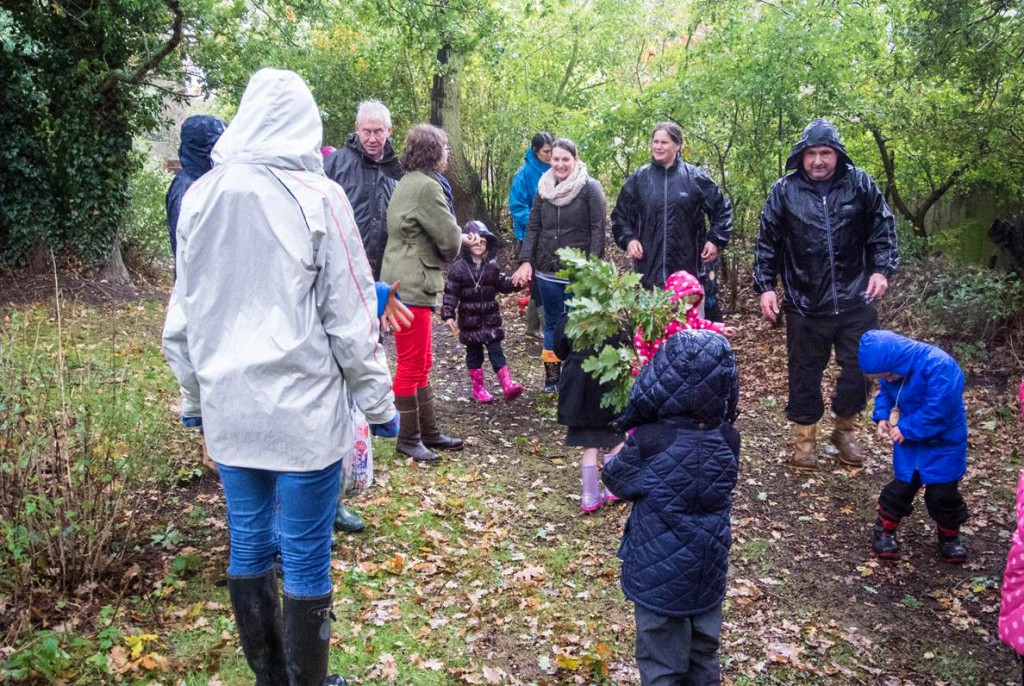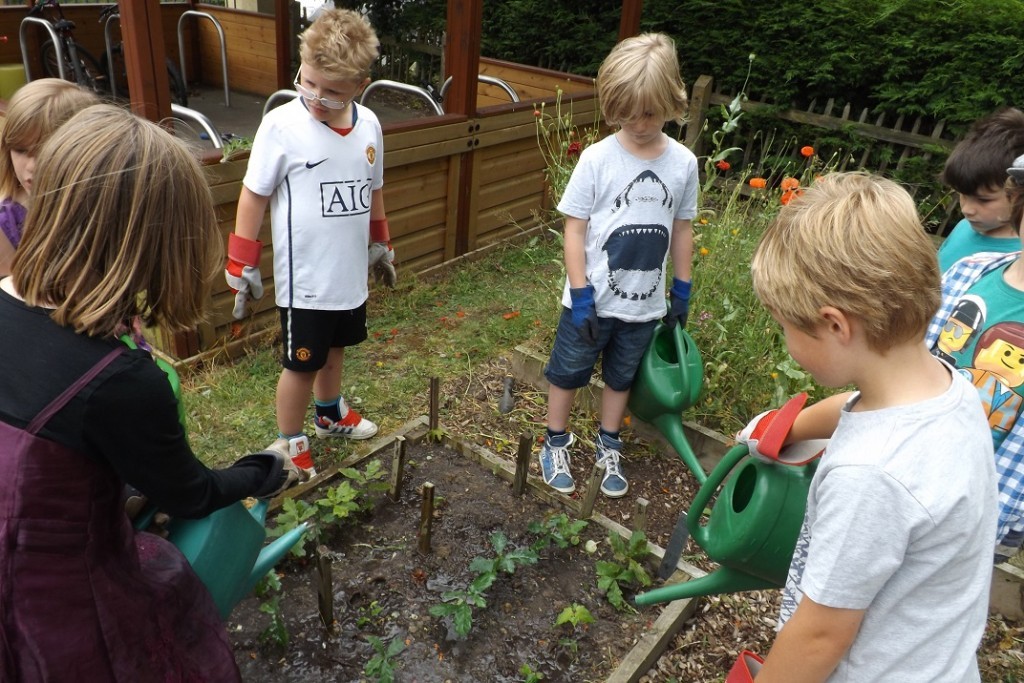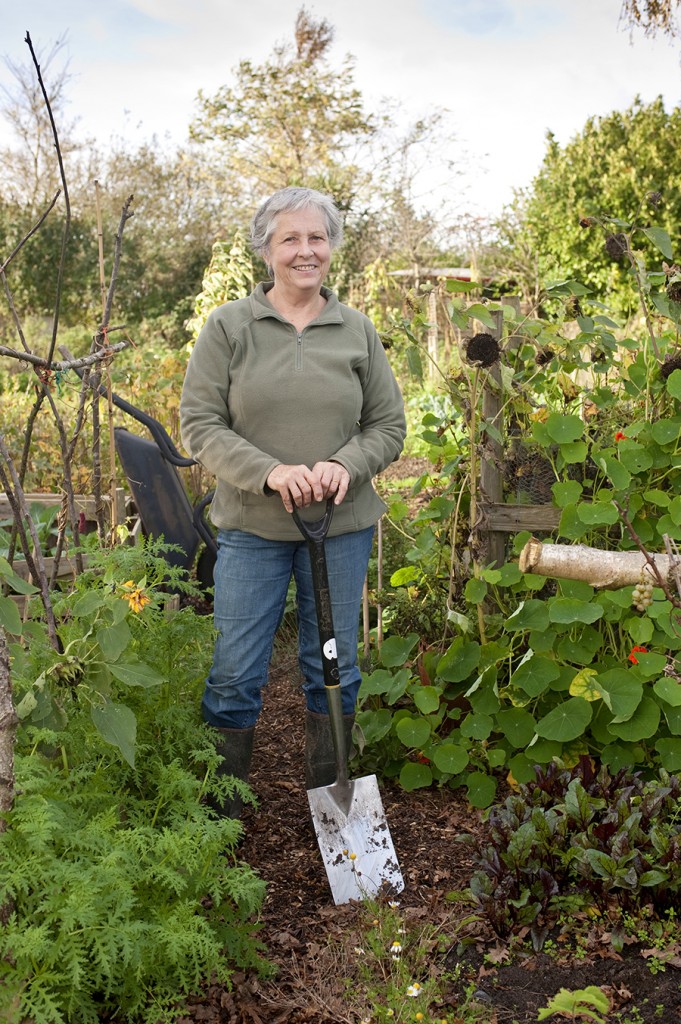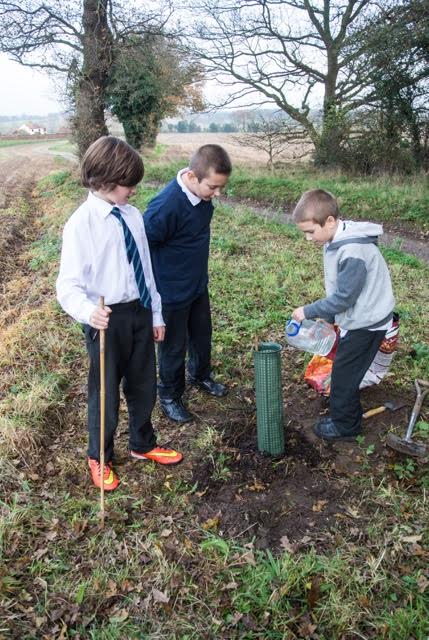In November, the UK faced its first possible power outage, due to lack of energy production. Small communities around the country have been steadily working on initiatives to cut energy consumption and promote renewable energy. One such is Wenhaston, in Suffolk.
Ann Edwards is one of a band of eco-conscious people who are aiming to turn Wenhaston into one of Suffolk’s greenest villages, by taking energy savings and environmental protection into their own hands. ‘If I’m living in a community,’ she says, ‘I need to be part of it and help it grow.’ This passion was forged in South America and Jamaica, where she lived for over 20 years.

School tree planting project
Ann’s parents worked full-time with Moral Re-Armament (MRA), the international moral and spiritual movement that later became Initiatives of Change. She left school at 16 to travel with an MRA musical which toured UK ports during the big seamen’s strike of 1966. When she was 23, she was invited to work as a multi-lingual secretary in Brazil. ‘I was always fascinated by South America and the ancient civilisations there,’ she says. She spent seven years based at the MRA centre near Rio de Janeiro, working with dockers’ families and in the favelas. She also spent time in Uruguay, Argentina, Chile, Colombia and Peru.
In 1980, she married Roddy Edwards and moved to his family’s home in Walkerswood, a village in the hills of St Ann, Jamaica. There she started a plant nursery on the farm and got involved with the community, working with the women to restart the local branch of the Jamaica Federation of Women. This led to the creation of a centre where women could socialise but also, more importantly, provided a kerosene tank. This meant women no longer had to travel three miles to the nearest tank or cut down trees for fuel. Ann campaigned with the community for the government to clean up the unlined municipal dump, which was threatening the underground aquifer on which the area’s water supply depended. They staged a play, which was seen by the
local MP and covered by radio and press, and finally blocked the main cross-island road in protest.
Fourteen years later the Edwards moved to the picturesque village of Wenhaston. In 2007, she and others started the Wenhaston Energy Support Group to look at reducing the carbon footprint of the village. ‘I have always felt we needed to be responsible for our environment and conscious of what we are leaving behind for our children,’ she says. One of the group’s projects was to help raise funds to install a biomass boiler and solar panels for the village hall, the first stop on my village development research mission.

Blyth Woods tree planting project
A second group grew out of the support group, to focus on planting woodland as a sustainable resource, for recreation and to teach children from the local school about the importance of trees. ‘It is important to plant a legacy for future generations,’ Ann says.
‘Wenhaston is known as a pioneer village for renewable energy and Ann has been instrumental in that process,’ says Sue Gow, who has worked with her on a number of village initiatives. ‘She works quietly and incredibly hard behind the scenes to make change happen, bringing people together and working along with her.’
In 2002 a group of parents got together to see how to improve the amenities for young people. Ann became chair of the local sports group, which raised £144,000 over the next seven years to build a skateboard park, a multi-use games area and a tennis court.
Ann was elected to the parish council in 2007 and has taken up a wide range of causes, often in a coordinating role – helping to secure land for allotments, contesting planning applications, campaigning for environmental awareness, petitioning for affordable housing and helping to organise ‘Give and Take’ days. ‘Each project that Ann works on has a social side – a community ethos,’ says Alan Hoddy, member of the allotment committee. ‘She is fair and listens to everybody’s opinions.’
What motivates this avid gardener and mother of two to spend so much time working on local change? ‘Leaving the planet in a good state,’ is Ann’s first answer. ‘We can’t leave it to the politicians, we all need to look at how we use resources and ensure we live within our means.’ Making a difference is also a motivator: ‘I enjoy working with people for a positive end.’ So is faith. She quotes St Francis’s prayer, ‘Make me an instrument of your peace’ and says that she believes in taking care of God’s creation.


Working for social change has its challenges and frustrations. Time is one of these and getting the right balance. At one point, Ann was working three part-time jobs as well as looking after elderly parents and the family. ‘There is the challenge of working with very different personalities – and not letting frustrations get to you when things don’t go according to plan.’
How does she deal with the pressures? ‘Roddy is a strength for me, especially to discuss matters with,’ she says. They seek guidance and inspiration together by taking time in silence every day, to try and find a higher wisdom. This helps to root her and gives space for reflection. ‘I try to take time to understand people and to build on people’s strengths: then they are more likely to be happy to be involved.’
When I ask about future projects, thinking Ann might be slowing down, my assumption is proved wrong. She runs through her continuing commitments: involvement through the Parish Council with the Neighbourhood Plan; finding the balance between development – so that young people can afford to live and work in the village – and maintaining the Area of Outstanding Natural Beauty; the school and woodland project; encouraging people to invest in renewables.
This is where democracy is built – at the local level. Ann is an example of this local democratic process at its best. According to Heather Phillips, who has served on Wenhaston’s parish council for a staggering 60 years, the councillors’ responsibility is ‘to improve village life, to listen to people and to bring their concerns to light’. Heather invited Ann to be part of the locally based Relief in Need Trust, which has existed for 500 years.
Knowledgeable, caring and passionate were some of the words used by locals to describe Ann. With her determination, commitment, unassuming leadership, she builds teams that work to make change happen – for the common good.
Photo credit: Jason Gairn